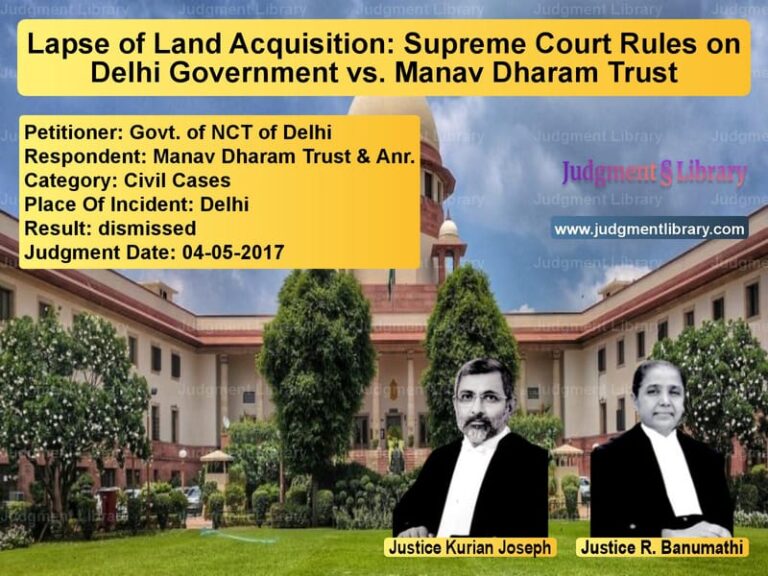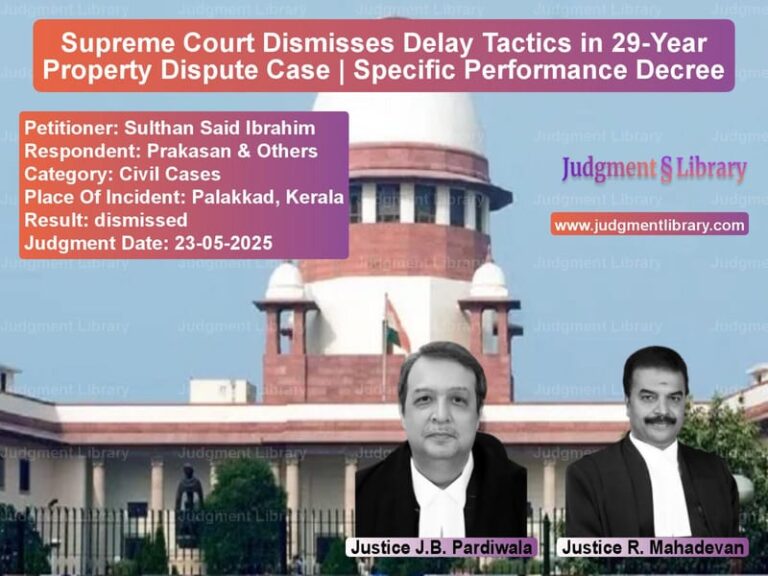Supreme Court Upholds Promissory Estoppel Against Jharkhand Government in Electricity Duty Exemption Case
The Supreme Court of India, in its landmark ruling in The State of Jharkhand & Ors. vs. Brahmputra Metallics Ltd., Ranchi & Anr., addressed a critical issue regarding the application of the doctrine of promissory estoppel. The case revolved around the Jharkhand Industrial Policy 2012 and its promise of an electricity duty exemption for industries setting up captive power plants. The Jharkhand High Court had earlier ruled in favor of the respondents, striking down the prospective effect of a government notification and upholding the retrospective application of the promised benefits.
Background of the Case
- The Jharkhand Industrial Policy 2012 was notified on June 16, 2012, promising a 50% rebate on electricity duty for a period of five years.
- The policy stated that necessary follow-up notifications would be issued within one month.
- The government delayed the notification until January 8, 2015, and applied it prospectively, depriving industries of the promised benefit for earlier years.
- The respondents, Brahmputra Metallics Ltd., challenged the prospective nature of the notification, arguing that the delay by the government violated the doctrine of promissory estoppel.
- The Jharkhand High Court ruled in favor of the respondents, deeming the notification to be effective from April 1, 2011.
Petitioner’s Arguments
The State of Jharkhand contended:
- The notification was issued under Section 9 of the Bihar Electricity Duty Act, 1948, and it was within the government’s discretion to decide its effective date.
- The respondents had not claimed exemption in their tax returns for the years in question.
- The challenge to the prospective effect of the notification was delayed and should be barred by laches.
- Adjusting electricity duty for past years would result in unjust enrichment for the respondents.
Respondent’s Arguments
Brahmputra Metallics Ltd. argued:
- The Jharkhand government made a clear promise in its Industrial Policy 2012.
- The delay in issuing the notification was arbitrary and denied them the full benefit of the exemption.
- Promissory estoppel applied as the company had made investment decisions based on the announced policy.
- The High Court correctly struck down the prospective nature of the notification and applied it retrospectively.
Supreme Court’s Observations
The Supreme Court, in its judgment delivered by Justices D.Y. Chandrachud and Indu Malhotra, made several key observations:
1. Validity of the Doctrine of Promissory Estoppel
The Court reaffirmed the principle that the government cannot resile from its policy commitments without a valid public interest justification.
“The Industrial Policy 2012 contained a representation that a rebate/deduction would be granted. It held out a representation that a notification would be issued in a month. These were solemn commitments made by the State of Jharkhand.”
2. Unfair Administrative Delay
The Court found the government’s delay in issuing the notification to be unreasonable and arbitrary.
“The State cannot make a solemn representation and then deny the benefit due to its own bureaucratic lethargy.”
3. No Justification for Prospective Application
The Court held that the prospective effect of the notification unfairly deprived industries of the benefits they were promised.
“There was no specific public interest justification for making the exemption prospective. The delay was not due to policy reconsideration but merely bureaucratic inefficiency.”
4. Legitimate Expectations and Investment Decisions
The Court highlighted that businesses make investment decisions based on government policies.
“When an industrial unit has made investment decisions based on state policy, the government cannot later deny the benefits due to its own inaction.”
Final Judgment
- The Supreme Court upheld the Jharkhand High Court’s decision.
- The notification dated January 8, 2015, was deemed to be effective from April 1, 2011.
- The electricity duty paid by the respondents for FYs 2011-12, 2012-13, and 2013-14 was ordered to be adjusted against future liabilities.
- The appeal filed by the State of Jharkhand was dismissed.
Implications of the Judgment
This ruling has far-reaching implications:
- Reaffirms that the government must honor policy commitments.
- Strengthens the doctrine of promissory estoppel in India.
- Ensures that bureaucratic delays do not unfairly deprive businesses of their entitlements.
- Encourages transparency and accountability in policy implementation.
The Supreme Court’s decision is a strong message that governments must be held accountable for their policy promises. It ensures that businesses can rely on government commitments when making long-term investment decisions.
Petitioner Name: The State of Jharkhand & Ors..Respondent Name: Brahmputra Metallics Ltd., Ranchi & Anr..Judgment By: Justice D.Y. Chandrachud, Justice Indu Malhotra.Place Of Incident: Jharkhand.Judgment Date: 01-12-2020.
Don’t miss out on the full details! Download the complete judgment in PDF format below and gain valuable insights instantly!
Download Judgment: The State of Jharkha vs Brahmputra Metallics Supreme Court of India Judgment Dated 01-12-2020.pdf
Direct Downlaod Judgment: Direct downlaod this Judgment
See all petitions in Tax Refund Disputes
See all petitions in Banking Regulations
See all petitions in Customs and Excise
See all petitions in Judgment by Dhananjaya Y Chandrachud
See all petitions in Judgment by Indu Malhotra
See all petitions in dismissed
See all petitions in Modified
See all petitions in supreme court of India judgments December 2020
See all petitions in 2020 judgments
See all posts in Taxation and Financial Cases Category
See all allowed petitions in Taxation and Financial Cases Category
See all Dismissed petitions in Taxation and Financial Cases Category
See all partially allowed petitions in Taxation and Financial Cases Category







